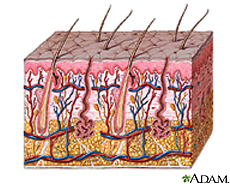National Institutes of Health
- The primary NIH organization for research on Psoriasis is the National Institute of Arthritis and Musculoskeletal and Skin Diseases
 A service of the U.S. National Library of Medicine
A service of the U.S. National Library of Medicine  National Institutes of Health
National Institutes of Health
Psoriasis is a skin disease that causes itchy or sore patches of thick, red skin with silvery scales. You usually get them on your elbows, knees, scalp, back, face, palms and feet, but they can show up on other parts of your body. A problem with your immune system causes psoriasis. In a process called cell turnover, skin cells that grow deep in your skin rise to the surface. Normally, this takes a month. In psoriasis, it happens in just days because your cells rise too fast.
Psoriasis can last a long time, even a lifetime. Symptoms come and go. Things that make them worse include
Psoriasis usually occurs in adults. It sometimes runs in families. Treatments include creams, medications and light therapy.
NIH: National Institute of Arthritis and Musculoskeletal and Skin Diseases
References and abstracts from MEDLINE/PubMed (National Library of Medicine)
